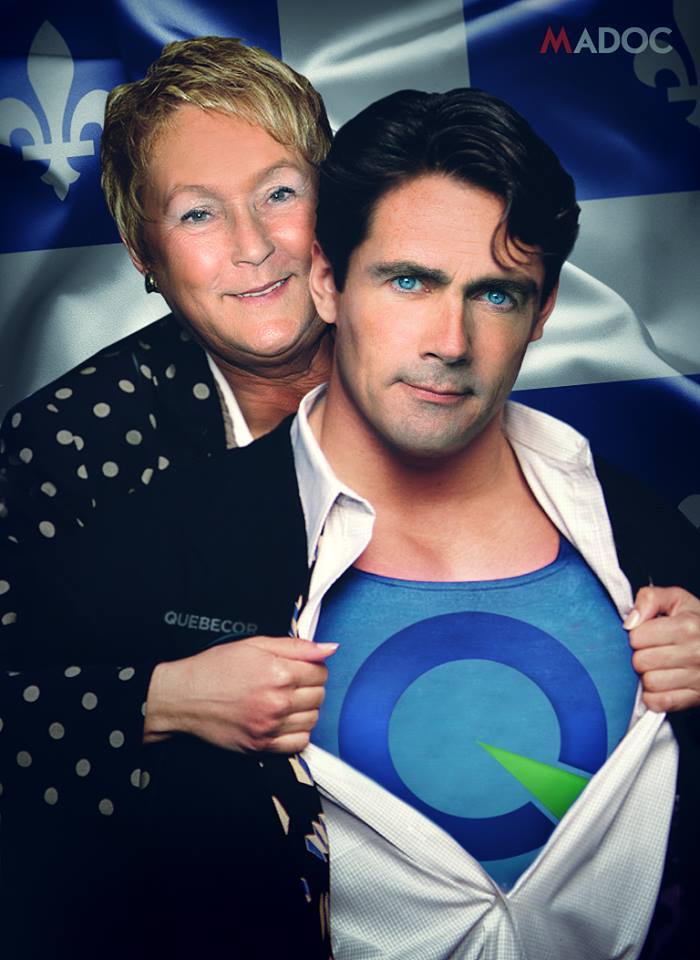Have a question about the Québec election? Want to know about where the parties stand on a particular issue? Let me know at [email protected].
Pierre Karl Péladeau (PKP) is the biggest news to hit Québec’s election so far. The arrival of PKP, owner of Quebecor, is the natural result of the Parti Québecois’ decades-long slide to the right.
In English media, PKP is portrayed as the sovereignist owner of Québecor media, potentially the most important media conglomerate in Canada. In Québec, he owns 40 per cent of the media. He also owns Vidéotron, the QMI agency and Sun TV.
In Québec, he’s the successful heir of an important media empire and a notoriously anti-union activist, but his influence extends beyond our borders. His media empire has been the kingmaker of folks like Rob Ford and Stephen Harper. It’s also the strongest force of anti-Québec sentiment in English Canada.
PKP’s appointment has only surprised those people who maintained their hope that the PQ is a centre-left party. During the 2012 election, the PQ won partly thanks to their promise to reverse many of the regressive higher education reforms that had been ushered in by the Liberals. They were elected thanks to many progressive-ish promises.
Since having been elected, they have lit aflame their progressive veneer. They made cuts to social aid, allocated $150 million to explore oil exploitation of Anticosti Island and introduced a plan to increase daycare fees by 29 per cent in two years and tie future increases to inflation. In higher education, the sector that arguably had the most influence on their election, they increased tuition fees by three per cent (the same amount as the Ontario Liberals), cut grants to institutions by five per cent and the provincial research fund by 30 per cent.
For people who are decidedly left, there’s no question about where on the political spectrum lies the PQ. However, institutionalized support from traditional, progressive organizations like unions has been harder to convince of the PQ’s rightward shift. During the 2012 election, the promise of strategic voting further pushed people toward the PQ as an attempt to get rid of the Liberal government of Jean Charest.
PKP’s addition to the party ranks makes it clear on which side is the PQ. He is staunchly anti-union, having overseen a record 14 lockouts throughout his media empire. When asked, Québec Solidaire co-spokesperson Françoise David said that there must be some pretty torn-up unionists among the ranks of their candidates within the PQ. Former Radio-Canada journalist Jean-François Lisée and current MNA is hopefully in anguish.
Until a few years ago, the most important dividing question in Québec was sovereignty. While the foundation of the sovereigntist movement is progressive, two camps emerged and they fell along the lines of left and right. The left-fight axis exists within the federalist camp too.
The election of the NDP in 2011 signalled that the axes had significantly evolved. The NDP was elected not out of a show of massive federalist support (as some party members outside of Québec have argued), but from a deep desire to get rid of Stephen Harper.
After years of this shift and after the 2011 federal election, political questions have continued to play out on a right-left axis. The emergence of the student strikes put the question of austerity and public services at the fore and people engaged. Charest’s loss was more about defeating austerity than it was about supporting sovereignty.
Québecers have been betrayed by Marois on two fronts: austerity policies have been the norm as Marois’ government has strived to reduce the provincial deficit and independence has only been dangled in front of Québecers’ noses as a one-word argument to give her a majority.
Independence can only be supported if it’s a progressive project. Otherwise, Québec will become a mini-Canada (or a mini-mini-United States) where oppression and capitalism is reproduced and folks like PKP operate like neoliberal democratic kings. This independence is fuelled by a nationalism that is xenophobic and it’s this independence that is used to whip up Anglophone fears.
The NDP sweep in 2011 was a wave of anti-Harper sentiment. Québecers are not exposed to pro-Harper media outlets the way that Canadians are in the rest of Canada. For everyone I’ve ever talked to about federal politics in Québec City, they want Harper out. I’ve been begged to explain why it is Canadians like him so much that they re-elected him.
The man behind these pro-Harper outlets is PKP. So, while perhaps a sovereigntist while running for the Parti Québecois, he was also the head of Harper’s greatest cheerleaders. This contradiction is easy to explain: PKP doesn’t care about the future of Québec, he’s a capitalist. He cares about access to markets and his bank accounts.
The Parti Québecois needs just 9 more seats than they have now for their majority. PKP is a gamble. Clearly, they’re not worried about losing support from the left. They’re going after Liberal and CAQ voters in regions outside of Montreal. In Québec City for example, where PKP and the city’s mayor Regis Labeaume are working to bring an NHL team here, the PQ got a boost in the polls after the PKP announcement.
But, for a party like Québec Solidaire, where progressive social policy trumps vacant populism, as co-spokesperson Françoise David said, PKP is a gift.
Support for a party in Québec has been known to shift overnight. A sweep of the PQ in Québec City region would be monumental for the party as they currently only represent two of 11 ridings here. But so too would be finally pushing labour’s support over to Québec Solidaire.
At this stage of the race, I’d say l’effet PKP will more likely result in the latter.
Image: facebook/NON à Pierre-Karl Péladeau en Politique



